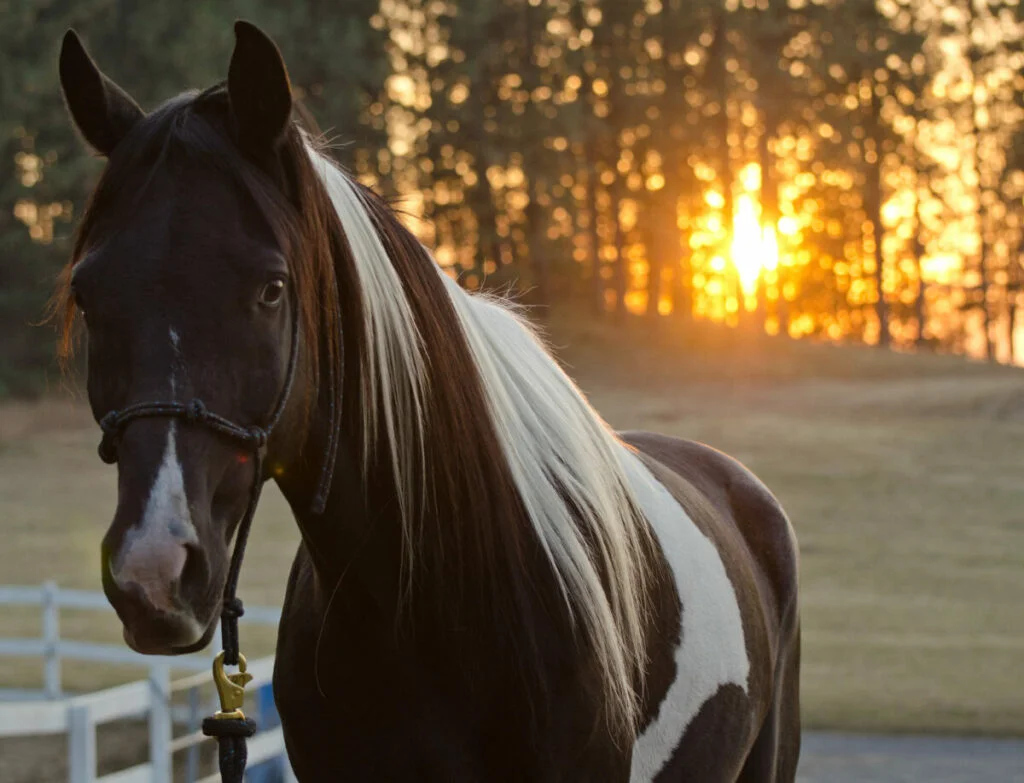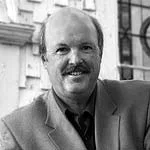When the leg appeared out of the darkness, flung over the gate of the neighboring corral, I was howling along with Emmylou Harris. “Beneath Still Waters” was booming from the CD player in the old door-less refrigerator in Jackie’s garden, where I was sitting with Jackie until just minutes before when she went off in search of a horse I had seen passing along the dirt road like a phantom.
Jackie swore I was seeing things. “You come out to Archer City, Texas and you think there’s nothing around here but horses.” But she set out to humor me nonetheless, shuffling off around the corner. Emmylou sang out, “Beneath still waters, there’s a strong undertow/The surface won’t tell you what the deep water knows.”
That’s when the leg appeared in the light of the green bulb shining through the translucent shell of Jackie’s mother-of-pearl lamp strung up over the limb of a hackberry tree.
I’d visited in Jackie’s garden enough times to know that a lot could happen there that you couldn’t explain. Wild stories could be slung, deep truths could be told, and a septuagenarian cowgirl living on the edge of the Southern plains could turn any collection of nocturnal visitors—animal, human, and varieties in-between—into a community of sorts. The garden was an island for misfit toys. I knew from my first audience with Jackie with a group of writers attending a local workshop that I’d be crawling my way back. And I did.
So the fact that random body parts were seeking entrance by any means did not strike me as surprising. The leg itself was impressive—long, muscular, and tanned with a work boot attached at the end. I wondered if it might be an apparition of a younger Jackie. But the rest of the woman who followed the leg was flesh and blood.
“I lost Jackie,” she said, as if this were a common occurrence and I was a familiar, sympathetic witness. “She’s got the damn horse but she ain’t gonna like it.” Then she tromped off toward the darkened side stalls where Jackie had disappeared.
I wasn’t asked but I followed her. “There she is,” the woman said and in the dim light I could see Jackie in her long frock clanging gates to get the paint (my eyes had not deceived me!) installed for the night. I leaned against the top rail of an iron gate, wondering at this force of nature beside me.
She was of an indeterminate age—somewhere between forty and eternal. She had reddish hair and freckles. The broad shoulders of a working cowgirl. And the agitated and rapid-fire speech of a woman on the edge.
“She’s not going to like that horse in the morning. But it’s crazy. I just need to get rid of it.” I had no idea what the arrangements they were making were going to be, but it was fascinating.
“I’m Alex, visiting from Virginia.”
“Jody. Are you writing about Jackie? Somebody needs to write down her stories.”
“Well, that’s not why I’m here but I am collecting a few as I go along.”
“You ought to. I hated her when I first met her. She talked down the first horse I brought her when I was growing up. But she’s a genius.”
When Jackie finally made her way from the back lots we wandered again to the garden. In the green light, I could see the weathered faces the two women shared. But Jody’s eyes were blazing as she talked about buying a junk pick-up down in Lewisville with her mother. After discovering the transmission was bad she took it back, caused a ruckus, and had the cops called on her. She and her mom were tossed off the property. What a laugh!
Then Jody pulled out her phone and started sharing pictures of the horse with Jackie. They talked an intricate language that I couldn’t follow. Something about people wanting paints for racing but they aren’t built for it. They’re built straight so that their legs don’t stretch forward when they run. Plus they can’t draw as much breath because of their heart girth. But people love the look of them and keep trying to turn them into race horses.
I realized I was hungry for this exchange, however arcane. I wanted a language that rich to talk about the things I grope to describe. For the Virginia preacher it was a glimpse into another world—one that is larger and deeper than the one we settle for. Here on the plains it took a different kind of eyes to see how the particulars of horses and hard-bitten cowboys lent the wide world an edge that can’t be seen in the eastern Piedmont.
Larry McMurtry, who grew up in Archer City and who lived in the Virginia hills, too, for awhile, said, “The Western land is mostly not kind—it has always favored strength over beauty. The strength of the land has to be matched by a strength within people, or the people don’t survive. The milder, more responsive environments—Virginia, say—might please the eye but seem, in the end, insipid compared to the West.”1
Insipid seems a bit harsh. But then again, that’s what a Virginian would say. Every so often every single one of us should slip off to the wilderness and sling a leg into a place that’s a little more in touch with the primordial essence.
“I think Jody’s had a hard life,” I said to Jackie when Jody had vaulted back over the corral gate.
“She’s a good soul,” Jackie said. “What these folks need is not judgment. They’re human. They just need someone to look at them like a human being.”
Late in the night I made my way back to the old hotel where I was staying and stood in the middle of the blinking-light intersection by the courthouse. Not a vehicle in sight for twenty miles in any direction. But you can’t say there wasn’t a soul.
1Larry McMurtry, Walter Benjamin at the Dairy Queen, [Simon & Schuster, 1999], 201


Share this post with your friends.

